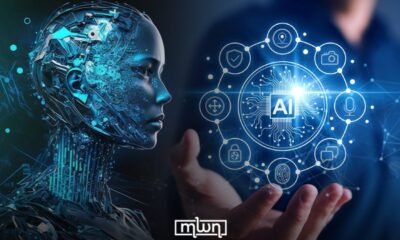AI Insights
Soft skills to survival skills: How to prepare for the ‘job apocalypse’ due to AI

The rise of artificial intelligence is already reshaping the global workforce, with experts warning that the ability to build skills such as judgment, empathy, adaptability and digital literacy will be essential to avoid being left behind.
As the technology evolves in waves, from automation to generative AI, agentic systems and eventually artificial general intelligence, millions risk losing their income and also their sense of purpose and identity.
Maha Hosain Aziz, professor at New York University and a member of the World Economic Forum’s Global Foresight Network, warned that the world rarely considers the broader social consequences of this disruption.
“We rarely connect the dots to what happens next – when millions lose not just income, but the anchor that work provides,” she wrote on the World Economic Forum’s platform.
“What happens when our education or years of work experience don’t matter as much any more? Many may face a grim choice: scramble to ‘learn AI’ to stay relevant – or drift into a new class, uncertain where they can fit in the AI economy.”
Ms Aziz outlined four waves of disruption, including traditional automation replacing routine jobs and generative AI transforming content creation and knowledge work.
Agentic AI is taking on multi-step tasks in areas such as HR, market research and IT, with the potential to replace midlevel managers.
By 2030, the world could see the rise of artificial general intelligence capable of most cognitive tasks.
“Each wave will displace another segment of the global working population,” Ms Aziz said.
“The challenge isn’t just how to re-employ people, but how to help them adapt to a future where their previous skills or identities may no longer be relevant. In a way, we’ve seen this before.”
She proposed two ideas: precariat labs, which are cross-sector hubs where governments, companies and civil society can test interventions for those at risk of AI-driven job loss, including retraining and mental health support.
She said there could also be a reimagined universal basic income focused on purpose, designed to restore belonging and meaning through civic projects and skill-sharing networks.
“The AI precariat may not make headlines like billion-dollar chip deals or breakthrough models,” she said.
“But it will shape the political, social, economic and security terrain of the next decade. If we want AI to be remembered as a tool for human flourishing, rather than mass alienation, we must start planning, not just for the jobs AI will create – but for the dreams it might erase.”
The UAE’s Human-Centered Approach
Nevin Lewis, chief executive at Black & Grey HR, told The National that while AI can automate many technical processes, it cannot replicate the interpersonal and cultural skills that are essential in markets such as the UAE.
“The UAE has always been a market where business is personal. Deals are not closed by contracts alone, but by trust built in meetings, majlis and boardrooms. AI can automate reporting, forecasting and approvals, but it cannot replace the human skills that build credibility in the UAE,” he said.
Mr Lewis said sales managers, client relationship leaders, hospital administrators, school principals and project directors as examples of roles that rely heavily on empathy and cultural awareness.
“These are not just ‘soft skills,’ they are survival skills in a multicultural economy,” he said.
Mr Lewis said that there should be a focus on developing employees’ AI fluency and data literacy.
“In retail, that might look like an e-commerce manager who can use AI to predict customer demand while still shaping a human-centred shopping experience. In banking, it could be a compliance officer who uses AI fraud detection alerts but still applies judgment before escalating,” he said.
“The future is not for those who only know how to code, but for those who can apply AI in business-critical ways.
“Technology can deliver the data, but it takes a leader to align teams, calm resistance, and keep people motivated in times of change.”
Invisible Job Losses
Bronwyn Williams, an economist and future trends analyst, told The National that the “job apocalypse” is already well under way, especially among entry level jobs.
“This creates a situation where economists and business leaders do not count the ‘invisible’ losses – the jobs that failed to materialise and absorb talent,” Ms Williams said, who wrote the Survive the AI Apocalypse: A guide for solutionists book, released this year.
“They are also undercounting the impact of underemployment, where people are accepting jobs below their skill sets and experience level to survive – or who are taking on multiple jobs to make ‘one’ living.”
She said many traditional salaried jobs are likely to disappear, but a new “value economy” is emerging where people are rewarded for the unique contributions they can offer.
Those who keep improving their skills and provide services that others are willing to pay for will continue to find work.
She said middle-class workers in developed countries are most at risk, while professionals in less wealthy regions could gain new opportunities.
She added that in today’s global economy, education or social status alone is not enough to protect a job, because technology allows similar work to be done elsewhere at a lower cost.
Preparing the next generation
Karuna Agarwal from Future Tense HR, based in the UAE, echoed Ms Williams thoughts and said that several categories of jobs are already under threat.
She said the responsibility to prepare for the AI age starts with education.
“Our educational systems has a focus on building key skills which is a combination of soft skills and digital skills in students who are the future professionals,” she said.
“The skills that cannot be replaced by AI are things like networking, critical thinking, agility, analytical thinking to name a few. It is very important for young professionals to update themselves in digital skills like AI and data literacy to be relevant and prepare themselves for the AI Age.”
AI Insights
How Artificial Intelligence is Redefining Business Process Automation

In today’s fast-paced economy, businesses are under constant pressure to operate more efficiently while reducing costs and improving customer experiences. Automation has long been a solution, but traditional methods such as simple scripts or rigid workflows often fall short in terms of adaptability and intelligence. This is where artificial intelligence comes into play. By partnering with an Artificial Intelligence Development Company, organizations can unlock new opportunities for smarter decision-making, streamlined operations, and scalable growth.
The growing interest in AI-driven automation reflects its role as a key enabler of digital transformation. Unlike conventional automation, AI systems can analyze large datasets, learn from patterns, and make predictions that allow businesses to stay competitive in increasingly dynamic markets.
Why AI for Business Process Automation
Traditional automation methods—such as scripts or Robotic Process Automation (RPA)—are useful for handling repetitive, rule-based tasks. However, they lack flexibility and cannot adapt to new or changing conditions without manual intervention. Artificial intelligence takes automation a step further by enabling systems to learn, adapt, and improve over time.
Through machine learning and advanced data analytics, AI can identify hidden patterns, make predictions, and support real-time decision-making. This makes it possible not only to automate processes but also to optimize them dynamically, driving more value than traditional approaches.
Key Areas of Application
Finance
AI enables faster and more secure payment processing, advanced transaction analysis, and fraud detection systems that continuously learn to recognize suspicious patterns.
Marketing and Sales
From demand forecasting and personalized customer experiences to intelligent chatbots, AI helps companies better understand their audience and increase conversion rates.
Manufacturing and Logistics
AI-powered tools streamline supply chain management, predict equipment maintenance needs, and reduce downtime, ensuring smoother operations and higher efficiency.
Human Resources (HR)
Recruitment processes are enhanced through automated resume screening, predictive analysis of employee retention, and data-driven insights for workforce planning.
Advantages of Implementation
The implementation of AI in business processes brings several clear advantages. One of the most significant is cost reduction: by automating repetitive, labor-intensive tasks, companies can cut manual rework and optimize resource allocation, which lowers operating expenses without sacrificing quality. AI also accelerates processes, as models are capable of handling large data streams in near real time.
This speed translates into faster approvals, more efficient routing, more accurate forecasting, and quicker customer responses, all of which shorten cycle times. Another key benefit is error minimization. With advanced pattern recognition and anomaly detection, AI reduces human error, ensures data consistency, and helps stabilize performance metrics across workflows.
Finally, AI offers unmatched flexibility and scalability. Systems continuously learn from new data, allowing them to adapt to changing rules and business volumes, while cloud-native deployments make it possible to scale operations seamlessly as demand increases.
Potential Challenges
Despite these benefits, businesses face certain challenges when adopting AI automation. Costs and timelines are among the first hurdles. The discovery phase, data preparation, model training, and integration require significant upfront investment, and success often depends on a phased delivery approach to manage risk.
Data quality is another critical factor. If the available data is incomplete, biased, or siloed, the outcomes will inevitably suffer. Strong governance, robust cleaning pipelines, and continuous monitoring are necessary to maintain reliable results. Ethical and legal considerations must also be addressed.
Organizations need to ensure that their AI solutions operate with transparency, fairness, and respect for privacy, while remaining fully compliant with regulatory standards and internal policies.
Conclusion
AI-driven automation is now a core lever of competitiveness, improving speed, accuracy, and margins while enabling adaptive operations. Start small, pick a high-impact process, validate with a pilot, then scale iteratively with robust data governance and clear ROI checkpoints.
Do You Want to Know More?
AI Insights
Local Events | coastsidenews.com

We recognize you are attempting to access this website from a country belonging to the European Economic Area (EEA) including the EU which
enforces the General Data Protection Regulation (GDPR) and therefore access cannot be granted at this time.
For any issues, contact customerservice@coastsidenews.com or call (650) 726-4424.
AI Insights
Here’s what parents need to know about artificial intelligence

ChatGPT, AI chatbots, and the growing world of artificial intelligence: it’s another conversation parents may not have planned on having with their kids.
A new Harvard study found that half of all young adults have already used AI, and younger kids are quickly joining in.
Karl Ernsberger, a former high school teacher turned AI entrepreneur, says that’s not necessarily a bad thing.
“It is here to stay. It’s like people trying to resist the Industrial Revolution,” Ernsberger said.
Ernsberger believes tools like chatbots can be powerful for learning, but only if kids and parents know the limits.
One example is “Rudi the Red Panda,” a virtual character available for free in kids mode on X’s Grok AI. When asked, Rudi can even answer questions about Arizona history.
GROK
“The five C’s of Arizona are Copper, Cotton, Cattle, Citrus, Climate,” Rudi said.
But Ernsberger warns that children may struggle to understand that Rudi isn’t real, and that “friendship” with a chatbot is different from human connection.
“It’s hard for the student to actually develop a real friendship,” he said. “They get confused by that because friendship is something they continue to learn about as they get older.”
When asked if Rudi was really my best friend, it replied: “I’m as real as a red panda can be in your imagination. I’m here to be your best friend.”
That, Ernsberger says, is where parents need to step in.
For families trying to keep kids safe while exploring AI, Ernsberger’s first recommendation is simple.
“Use it yourself. There are so many use cases, so many different things that can be done with AI. Just finding a familiarity with it can help you find the weaknesses for your case, and its weaknesses for your kids.”
Then he says if your child is using AI, be there with them to watch over and keep the human connection.
“The key thing with AI is it’s challenging our ability to connect with each other, that’s a different kind of challenge to society than any other tool we’ve built in the past,” Ernsberger said.
Regulators are paying attention, too.
Arizona Attorney General Kris Mayes, along with 43 other state attorneys general, recently sent a letter to 12 AI companies, including the maker of Rudi, demanding stronger safeguards to protect young users.
-
Tools & Platforms3 weeks ago
Building Trust in Military AI Starts with Opening the Black Box – War on the Rocks
-

 Business2 days ago
Business2 days agoThe Guardian view on Trump and the Fed: independence is no substitute for accountability | Editorial
-

 Ethics & Policy1 month ago
Ethics & Policy1 month agoSDAIA Supports Saudi Arabia’s Leadership in Shaping Global AI Ethics, Policy, and Research – وكالة الأنباء السعودية
-

 Events & Conferences3 months ago
Events & Conferences3 months agoJourney to 1000 models: Scaling Instagram’s recommendation system
-

 Jobs & Careers2 months ago
Jobs & Careers2 months agoMumbai-based Perplexity Alternative Has 60k+ Users Without Funding
-

 Funding & Business2 months ago
Funding & Business2 months agoKayak and Expedia race to build AI travel agents that turn social posts into itineraries
-

 Education2 months ago
Education2 months agoVEX Robotics launches AI-powered classroom robotics system
-

 Podcasts & Talks2 months ago
Podcasts & Talks2 months agoHappy 4th of July! 🎆 Made with Veo 3 in Gemini
-

 Podcasts & Talks2 months ago
Podcasts & Talks2 months agoOpenAI 🤝 @teamganassi
-

 Mergers & Acquisitions2 months ago
Mergers & Acquisitions2 months agoDonald Trump suggests US government review subsidies to Elon Musk’s companies






















